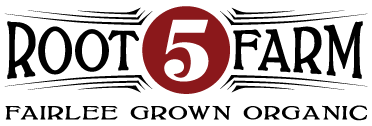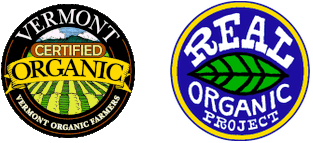COVID-19 Adaptations at Root 5 farm
Updated February 25, 2022
Dear Root 5 Farm CSA Members,
Three years in and we're continuing to remain vigilant of the risks posed by Covid-19 to ourselves, our employees, our patrons, our community, and our world as a whole. Until a time when this virus is classified as endemic our crew will continue to be diligent in identifying potential exposures, monitoring for signs of illness, testing as needed and quarantining appropriately.
Regardless of Covid-19 exposure, keeping our small team healthy is one of our highest priorities and a responsibility we take seriously. Our short, intense growing season depends on so many factors but our success is hugely dependent on our small crew of hardworking farmers. Any employee experiencing signs or symptoms of Covid-19 will remain off-farm until receiving a negative result as defined by the CDC.
We offer paid sick leave for employees experiencing illness and follows strict food safety protocols as part of our CAPS certification (Community Accreditation for Produce Safety) through the Vermont Vegetable & Berry Association. Our farm is unique in that it's not open to the public for farm stand sales, keeping exposure to possible contamination at a minimum.
We're following local guidelines regarding masking, and we ask that all CSA customers do the same at all public CSA pick up sites.
Ever grateful,
Danielle, Benner & the Root 5 Farm team.
Regardless of Covid-19 exposure, keeping our small team healthy is one of our highest priorities and a responsibility we take seriously. Our short, intense growing season depends on so many factors but our success is hugely dependent on our small crew of hardworking farmers. Any employee experiencing signs or symptoms of Covid-19 will remain off-farm until receiving a negative result as defined by the CDC.
We offer paid sick leave for employees experiencing illness and follows strict food safety protocols as part of our CAPS certification (Community Accreditation for Produce Safety) through the Vermont Vegetable & Berry Association. Our farm is unique in that it's not open to the public for farm stand sales, keeping exposure to possible contamination at a minimum.
We're following local guidelines regarding masking, and we ask that all CSA customers do the same at all public CSA pick up sites.
Ever grateful,
Danielle, Benner & the Root 5 Farm team.
As a Root 5 Farm Share member, please observe the following when picking up your CSA box:
Our first priority is to keep everyone safe and healthy. Please practice physical distancing while picking up your CSA Share:
- All of our pick up sites all have a 6-8 hour pick up window, which will naturally spread out foot traffic of CSA members.
- We recommend that you wear a mask. Give space to others, wait your turn to pick up if there are other members picking up at the same time, and maintain 6’ distance.
- If you’re experiencing any signs of illness (fever, coughing, shortness of breath, chills, muscle pain, soar throat, loss of taste or smell), or if you’ve had contact with anyone with a positive Covid diagnosis, please log-in to your CSA account to put your share on hold for the week, or send a substitute to pick up for you.
COVID-19 Transmission Via Fresh Produce Not Seen as a Threat
REVIEWED February 25, 2022
Summary of Our Understanding: As of this time, global, national, and local health authorities have yet to confirm any transmission of the novel coronavirus causing COVID-19 via food.
Prior research on other related coronaviruses show that all have low survival rates on food. Food safety and health authorities globally recommend that the best strategies to reduce risk and prevent the spread of COVID-19 via any food are essentially the same as the strategies for risk reduction and infection prevention in daily life, namely:
RESOURCES HELPING US COME TO THESE CONCLUSIONS:
US Food & Drug Administration, COVID-19 FAQ page
“There is no evidence of human or animal food or food packaging being associated with transmission of the coronavirus that causes COVID-19. Unlike foodborne gastrointestinal viruses like norovirus and hepatitis A that make people ill through contaminated food, SARS-CoV-2, which causes COVID-19, is a virus that causes respiratory illness. This virus is thought to spread mainly from person to person. Foodborne exposure to this virus is not known to be a route of transmission.” (4/2/20)
European Food Safety Authority, “Coronovirus: No Evidence That Food is a Source or Transmission Route”
EFSA’s chief scientist, Marta Hugas, said: “Experiences from previous outbreaks of related coronaviruses, such as severe acute respiratory syndrome coronavirus (SARS-CoV) and Middle East respiratory syndrome coronavirus (MERS-CoV), show that transmission through food consumption did not occur. At the moment, there is no evidence to suggest that coronavirus is any different in this respect.” (3/9/2020)
Food Safety Authority of Ireland, COVID-19 FAQ page
“Experience with SARS and MERS suggest that people are not infected with the virus through food. So, it is unlikely the virus is passed on through food and there is no evidence yet of this happening with COVID-19 (coronavirus) to date.
Coronaviruses need a host (animal or human) to grow in and cannot grow in food. Thorough cooking is expected to kill the virus because we know that a heat treatment of at least 30min at 60ºC is effective with SARS.” (Last reviewed by FSA Ireland, 4/9/20.)
University of Vermont Extension, COVID-19 Resources for Vermont Vegetable and Berry Growers
Summary of Our Understanding: As of this time, global, national, and local health authorities have yet to confirm any transmission of the novel coronavirus causing COVID-19 via food.
Prior research on other related coronaviruses show that all have low survival rates on food. Food safety and health authorities globally recommend that the best strategies to reduce risk and prevent the spread of COVID-19 via any food are essentially the same as the strategies for risk reduction and infection prevention in daily life, namely:
- Stay home and away from public sources of food if you exhibit any symptoms of COVID-19, such as fever, cough, and shortness of breath;
- Wash your hands thoroughly for 20+ seconds prior to handling food
- Wash fresh produce before consumption;
- Avoid touching your face while handling food;
- Maintain distance from others of at least 6 feet.
RESOURCES HELPING US COME TO THESE CONCLUSIONS:
US Food & Drug Administration, COVID-19 FAQ page
“There is no evidence of human or animal food or food packaging being associated with transmission of the coronavirus that causes COVID-19. Unlike foodborne gastrointestinal viruses like norovirus and hepatitis A that make people ill through contaminated food, SARS-CoV-2, which causes COVID-19, is a virus that causes respiratory illness. This virus is thought to spread mainly from person to person. Foodborne exposure to this virus is not known to be a route of transmission.” (4/2/20)
European Food Safety Authority, “Coronovirus: No Evidence That Food is a Source or Transmission Route”
EFSA’s chief scientist, Marta Hugas, said: “Experiences from previous outbreaks of related coronaviruses, such as severe acute respiratory syndrome coronavirus (SARS-CoV) and Middle East respiratory syndrome coronavirus (MERS-CoV), show that transmission through food consumption did not occur. At the moment, there is no evidence to suggest that coronavirus is any different in this respect.” (3/9/2020)
Food Safety Authority of Ireland, COVID-19 FAQ page
“Experience with SARS and MERS suggest that people are not infected with the virus through food. So, it is unlikely the virus is passed on through food and there is no evidence yet of this happening with COVID-19 (coronavirus) to date.
Coronaviruses need a host (animal or human) to grow in and cannot grow in food. Thorough cooking is expected to kill the virus because we know that a heat treatment of at least 30min at 60ºC is effective with SARS.” (Last reviewed by FSA Ireland, 4/9/20.)
University of Vermont Extension, COVID-19 Resources for Vermont Vegetable and Berry Growers



